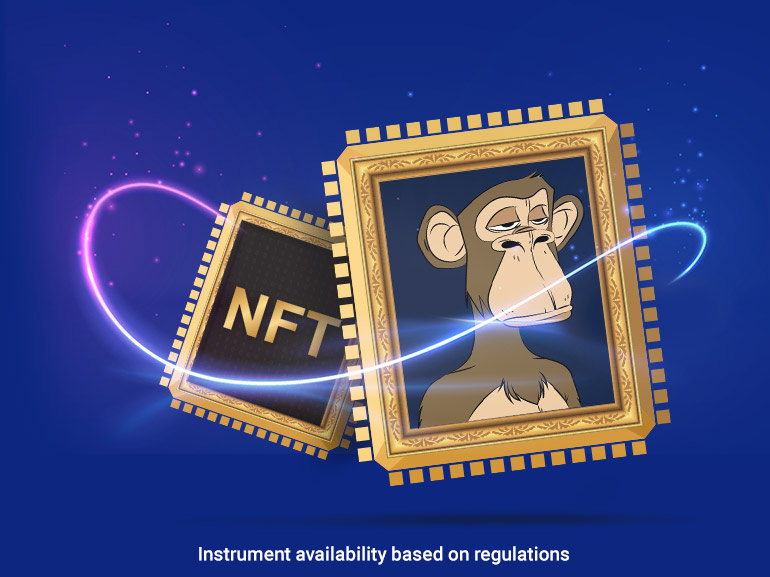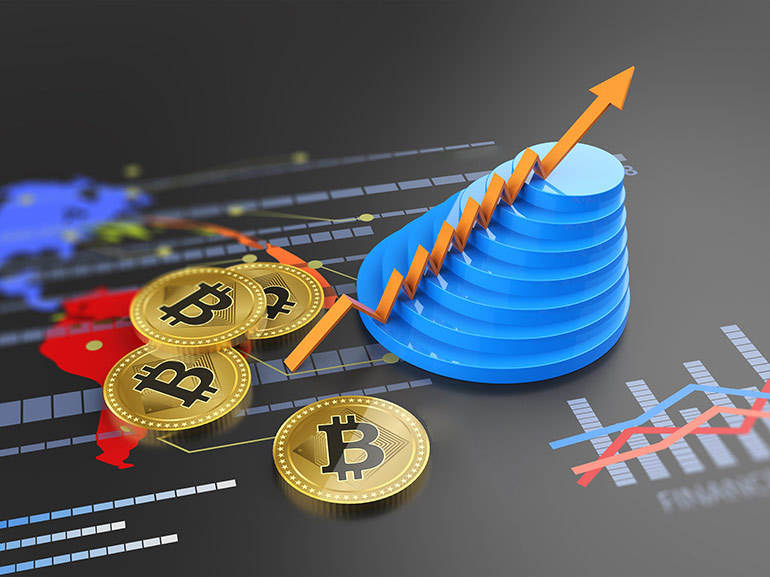NFTs Trading Explained: What Are NFTs & How Do You Trade Them?
Despite the drops in NFT trading activity in 2024, overall, NFTs have repeatedly succeeded in making the headlines over the past couple of years. For example. in 2022 alone, trading in the NFT market spiked by a whopping 21000% and hit $17.6 billion.
Additionally, many renowned brands, like Nike, Adidas, and Disney, have embraced NFTs, expressed interest in them, and made serious moves to invest in this sphere. It is, therefore, highly likely that you’ve heard of or read about the world of NFTs one way or another, but did you ever actually delve deeper into what they are and how you can gain exposure to them? Let's take a closer look:

What Are NFTs?
NFTs or Non-Fungible Tokens are cryptographic assets that digitise real-world objects. In other words, NFTs take tangible and non-tangible objects that are often encountered in real life, like real estate, music, GIFs, collectables, avatars, designer sneakers, clothes, art, in-game videos, and even tweets, and turn them into digital assets; the possibilities are endless.
The digital assets are then usually traded online and are often purchased and sold using cryptocurrencies.
NFT Minting: How Do NFTs Function?
NFT minting involves creating a unique digital asset on a blockchain and turning digital files into Non-Fungible Tokens (NFTs).
This process ensures authenticity and ownership by recording the file in a secure, tamper-proof ledger.
Once minted, NFTs can be sold, traded, or retained, with their uniqueness and value guaranteed by the blockchain.

NFTs and Cryptocurrencies: What's the difference?
Whereas NFTs are supported by blockchain technology like Bitcoin Cash and other cryptocurrencies, they mainly run on the Ethereum blockchain and are often paid for in crypto. However, while NFTs are also decentralized the two don’t have any further similarities.
Whereas NFTs, like cryptocurrencies, are supported by blockchain technology and are decentralised, the two have no further similarities.
While cryptocurrencies are fungible and can be exchanged for one another, NFTs, as their name suggests, are not. This means that while you can replace one Bitcoin with another as it can retain the same value, NFTs cannot be traded for one another or duplicated. This is because each NFT has a personalised and special digital signature that makes it hard to replicate. The digital signature is essentially proof of the authenticity of the NFT as each NFT creator can sign their NFT with their own special signature and authorise it. For example, if someone intends to sell a copy of an NFT, it is highly unlikely that it will be sold because the NFT’s original owner did not authorise the copy. Unauthorised copies do not have the creator’s digital signature, and the digital signature is what shows its authenticity.
Nonetheless, NFT files can be copied and distributed, which might make the prospect of them being “non-fungible” sound like a paradox. Despite that, they actually still retain their individuality. The reason for this is that, even though they can be copied, they cannot be duplicated which means that they get to obtain their originality - This is the trait that made them popular to begin with.
Indeed, this might seem a bit confusing, so to better understand what might seem like a contradictory idea, one can look at NFTs like famous art pieces or collectables. For example, while there are multiple copies of Leonardo Da Vinci’s famous painting “The Mona Lisa”, the original and only painting (as far as we know) is presented exclusively at the Louvre. This element of exclusivity and non-fungibility is translatable to NFTs and is arguably where they derive their value from. Furthermore, NFTs are also considered extensible which means that you can merge one NFT with the other to create a third breed of NFTs.
Trading NFTs
NFT-Related Indices
There are myriad access points available into the world of NFTs. One way to gain exposure to NFTs is through trading CFDs on the NFT Giants Index on the Plus500 platform. This index tracks the trajectory of some NFT-related companies like Activision Blizzard, DraftKings, Mattel, WWE, and more.
NFT-Related Shares
Another means of gaining exposure to companies related to NFTs is through trading CFDs on NFT-related shares without owning the underlying asset. You can trade CFDs on the companies that have adopted this relatively new technology. For example, in 2021 beverage mogul, Coca-Cola released its first-ever NFT collectables to celebrate Friendship Day. The NFT raised $575,000 to benefit The Special Olympics International organisation. Fast-food giant McDonald’s has also set foot in the NFTs and the Metaverse industries by launching its first NFT in celebration of its 40th anniversary in 2021.
Other companies that have embarked on the NFTs journey are Twitter, Nike, Coinbase, and eBay. Moreover, airline companies like Lufthansa's replaced air miles with NFT trading cards in 2024.
Accordingly, one can gain exposure to the NFT world through trading CFDs on these stocks.
NFT History: When Were NFTs Created?
To truly understand the history of NFTs, it is important to familiarise oneself with the history of blockchain technology. This is important because NFTs are supported by blockchain technology.
2008: Satoshi Nakamoto, the inventor(s) of Bitcoin, launched blockchain technology to the world.
2014: Quantum, the first and the only NFT to have been created on the Bitcoin network, emerged. It was launched by Kevin McCoy. This NFT has supposedly “revolutionised” art ownership and reshaped the art world.
2017: This year was a key one for the NFT market. Many unique NFTs built on the Ethereum blockchain emerged, putting NFTs on the public's radar.
2021: A surge in NFT trading materialised with the launch of projects like CryptoKitties and CryptoPunks, along with the advancement of the metaverse.
2024: Whereas, overall, NFT market had a less-than-optimistic year in 2024 as trading activity experienced a notable downturn, on 11 October, it was announced that Solana's on-chain NFT trading revenue was $21,300, accounting for 32% of total NFT trading revenue, surpassing other blockchain networks in NFT income.
What’s Next?
While NFTs certainly made a buzz in 2021, the NFT marketplace has been experiencing a slight downturn in the past couple of years.
Nonetheless, while this niche market might be experiencing a downtrend, some experts believe that the future for NFTs is actually bright and is expected to increase to $80 billion by 2025.
Traders and investors alike might have to wait and see for themselves what the future holds for this burgeoning space.
NFTs FAQs:
What is an NFT?
An NFT (Non-Fungible Token) is a unique digital asset that represents ownership of a specific item or piece of content on a blockchain.
What is the first NFT?
The first NFT is widely considered to be "Quantum" by Kevin McCoy, created in 2014 on the Namecoin blockchain.
What is the difference between NFTs and cryptocurrencies?
NFTs are unique, non-interchangeable digital assets representing ownership, while cryptocurrencies are fungible digital currencies used for transactions and as a store of value.






